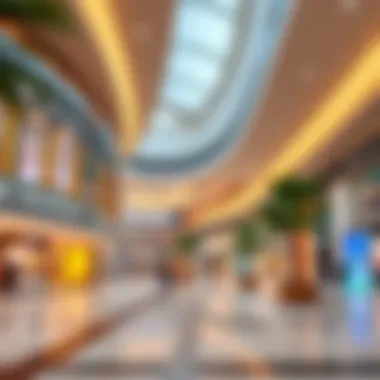Meydan One Mall Cancellation: Impact on Dubai's Market


Intro
The cancellation of the Meydan One Mall project has stirred considerable conversations across the Dubai real estate landscape. What once promised a revolution in retail and leisure is now a subject of inquiry into the shifting tides of investment and development strategy in one of the world's most dynamic markets. By diving deep into this situation, we aim to unravel the intricate reasons behind this decision and the potential ramifications that ripple through various sectors.
With the real estate market noticeably evolving, understanding these shifts is crucial for investors, development strategists, and homebuyers alike. This article seeks not just to dissect the cancellation's causes but also to analyze its broader impacts, offering insights into future investment opportunities in Dubai and beyond.
Market Insights
Current Trends in Dubai Real Estate
Dubai's real estate sector has always been a fluid environment, constantly adapting to new consumer demands and economic conditions. The announcement of the Meydan One Mall's cancellation comes at a time where retail dynamics are shifting towards experiential offerings rather than conventional shopping experiences. The rise of e-commerce and changing consumer preferences underlines this transformation, prompting developers to rethink their strategies in urban projects.
The recent integration of smart technology in properties and a focus on sustainability are defining current market trends. Buildings are not just structures anymore; they're becoming part of a larger ecosystem that considers both environmental impact and user experience. Investors should take note of these trends as they indicate where the market may be headed next.
Analysis of Investment Opportunities
In the wake of the Meydan One Mall cancellation, investors might find silver linings among the clouds. Although a setback, this may create openings for new projects better aligned with current demands. For instance, potential redevelopment of the site could focus on mixed-use projects or community-centric spaces that emphasize leisure and culture.
When considering investment here, a diversified portfolio encompassing various types of properties—ranging from residential complexes to commercial spaces—could prove valuable. Here are some key areas for consideration:
- Mixed-use developments that integrate retail, dining, and residential spaces
- Sustainable real estate projects that target eco-conscious investors
- Cultural spaces that promote local art and heritage, attracting both residents and tourists
Real estate investment in Dubai has always been inherently risky, but understanding these nuanced shifts could place investors ahead of the curve, ready to capitalize when the time is right. The dynamic landscape invites those willing to adapt and reconsider traditional understandings of space and function.
Neighborhood Features
Spotlight on Popular Developments
While the Meydan One Mall was set to be a significant retail and entertainment hub, many other developments around Dubai continue to attract interest. Areas such as Dubai Marina, Business Bay, and Downtown Dubai are thriving with new projects and revitalizations. For instance, Dubai Marina is not just known for its waterfront views but also offers an array of dining and shopping options that appeal to both locals and expatriates. This competitive spirit might indicate the kind of offerings that residents want going forward, highlighting a trend in favor of leisure spaces that prioritize quality and experience over sheer size.
Comparison of Different Areas in Dubai
When considering where to invest or buy property in Dubai, comprehensively analyzing various neighborhoods is invaluable. Some key points of comparison include:
- Accessibility: Ease of transport links to major business hubs can enhance property value.
- Amenities: Proximity to schools, hospitals, shopping districts impacts lifestyle choices for families.
- Market Dynamics: Understanding which areas are gaining traction can offer lucrative opportunities.
For those keen on navigating the evolving landscape of Dubai's real estate market, familiarizing oneself with these features and variations among neighborhoods will sharpen investment decisions and identify promising prospects.
The future of Dubai's real estate is not merely about buildings; it’s a reflection of lifestyle, sustainability, and adaptability to the changing needs of its residents and businesses.
Whether in bustling urban centers or emerging districts, the lessons learned from the cancellation of Meydan One Mall will undoubtedly shape the conversation around investment in Dubai for years to come.
For an added perspective on the evolving dynamics of Dubai, you might find insights from sources such as Dubai Land Department and Dubai Property Times useful.
Preface to Meydan One Mall
The cancellation of Meydan One Mall has not just left a gap in Dubai's skyline but also stirred discussions regarding the future of retail in the region. This project was seen as a flagship development that aimed to redefine shopping experiences, blending luxury with modern convenience. Given the anticipated footfall and economic boost, the decision to halt the project warrants a keen analysis of its wider impact.
In the context of this discussion, understanding the breadth of Meydan One Mall is crucial. The mall was envisioned to be a hub of entertainment, dining, and retail, drawing in both tourists and locals alike. It promised not just to enhance the consumer landscape but also to contribute significantly to the local economy by attracting investments and generating jobs. Unfortunately, these expectations have become a tale of what could have been.


The following segments will delve into the intricate layers of this cancellation. The analysis will cover the project's original vision, including its proposed location and unique features. By scrutinizing these aspects, we can gain insight into the factors leading to its cancellation and the subsequent repercussions on various stakeholders, including investors and local businesses.
Understanding Meydan One Mall isn’t merely about exploring a discontinued project; it’s an exploration into the fabric of Dubai's evolving commercial landscape. What does the cessation of this grand project signify for the trends in retail, real estate investment, and Dubai's broader economic conditions? Such inquiries will guide our thorough examination of the implications that ripple through this cancellation.
Factors Leading to Cancellation
The cancellation of Meydan One Mall was not a knee-jerk reaction but rather a result of multiple intertwined elements that shed light on the current state of Dubai's real estate market. Understanding these factors is crucial for investors, property managers, and home buyers aiming to navigate this complex landscape.
Market Conditions
The current market conditions in Dubai's real estate sector have been tumultuous to say the least. Fluctuations in demand have left many developers second-guessing their strategies. Experts note that ongoing geopolitical tensions, coupled with the aftershocks of the pandemic, have laid a heavy hand on consumer sentiment.
- Decreased Foot Traffic: Unlike the pre-pandemic boom, people are now reluctant to venture out, favoring online shopping over physical store visits. It's a trend seen worldwide, but it hits hard in places like malls that were once bustling hubs.
- Increased Competition: With numerous developments competing for the same target audience, standing out has become a task akin to finding a needle in a haystack. Malls that promise unique experiences often trump those that merely offer retail space.
- Economic Uncertainty: The prevailing economic climate has many households tightening their belts. This shift leads to a tougher gamble in investing in large-scale projects that may not generate immediate returns.
As market dynamics shift, it's evident that Meydan One Mall's cancellation was a decision steeped in caution rather than impulsivity.
Financial Constraints
Financial considerations also played a significant role in the decision to halt the Meydan One Mall project. This sector requires substantial capital investment, and when financial winds shift, projects can quickly become liabilities rather than assets.
- Funding Challenges: With interest rates rising, securing funding has become increasingly difficult. For a project of such magnitude, traditional investors are often hesitant to commit when uncertainties loom.
- Rising Costs: Construction costs have surged in recent years due to inflation and supply chain disruptions. The original budget may have had a defined scope, but unexpected costs can quickly spiral out of control.
- Risk Aversion: In times of economic downturn, investors often exhibit risk-averse behavior, preferring to hold onto their capital rather than invest in projects perceived as high-risk.
These financial constraints collectively raise red flags. For investors, it's about weighing the risks against potential rewards, and in the case of Meydan One Mall, the scales tipped unfavorably.
Changing Consumer Preferences
As society evolves, so do the preferences of consumers. In the case of Dubai, the traditional mall concept is increasingly under scrutiny, leading developers, including Meydan's team, to reconsider their approach.
- Embrace of Experiences: Shoppers now look for more than just goods; they seek memorable experiences. Consequently, malls that merely offer retail options may not resonate with modern consumers. Those that provide entertainment, dining, and unique social spaces are winning the day.
- Sustainability Trends: An increasing awareness of sustainability prompts consumers to favor brands and developments that prioritize eco-friendly practices. If the Meydan project didn't align with these values, it might have struggled to attract patronage.
- Digital Transition: The acceleration of e-commerce has shifted consumer behavior significantly. A significant portion of shopping now occurs online, leading consumers to prefer convenience over traveling to malls.
These evolving consumer dynamics suggest that the market's appetite is shifting, creating a need for projects that are adaptable and innovative. For Meydan One Mall, the traditional mall model perhaps didn’t hold the same appeal as it once did.
In summary, the cancellation of Meydan One Mall can be seen as a reflection of the multifaceted challenges facing the Dubai real estate market, influenced by market conditions, financial constraints, and changing consumer preferences. Investors must navigate these waters carefully, keeping a finger on the pulse of these developments.
Impact on Stakeholders
The cancellation of Meydan One Mall has wide-ranging ramifications for various stakeholders imbedded within Dubai's real estate ecosystem. Understanding these impacts is crucial, as it sheds light on the intricate relationships between investors, local businesses, and employees—all of whom are often intertwined with large-scale projects. The stakes are high when a development of this magnitude is scrapped. The analysis considers how these stakeholders are affected not only in the immediate context but also in the long run, influencing future decisions and investments.
Effect on Investors
For investors, the cancellation serves as a stark reminder of the volatile nature of real estate. Many had pinned their hopes on the project to deliver substantial returns. Some may have investd significant capital, assuming the mall would create a hub for retailers and foot traffic in the surrounding area. The abrupt halt can lead to both financial loss and a reevaluation of risk appetite.
- Financial Implications: Investors might find themselves sitting on unanticipated losses, particularly if they were heavily invested in related schemes that relied on the mall's anticipated success.
- Trust Concerns: This type of decision can shake confidence in the market, leading investors to hesitate for future opportunities.
A potential silver lining exists in the form of lessons learned. Investors might seek to diversify their portfolios or identify emerging trends that signal changing consumer behavior. Even though immediate prospects may seem bleak, strategic pivots could pave the way for future successes in differing ventures.
Reactions from Local Businesses
Local businesses are often the backbone of major developments, leveraging new traffic and commerce. But with the cancellation of Meydan One Mall, the outlook for these businesses has darkened.
- Economic Ripple Effect: Smaller businesses relying on anticipated consumer influx may consider layoffs or even closure. Without the mall, their revenue streams might dwindle.
- Retail Adaptation: Those businesses that were gearing up to set up shop in the mall face a backlash. They might scramble for alternative venues or reconsider their operational strategies.


“The loss of a development like this is felt by everyone. Local shops thrive on foot traffic. Without it, survival becomes a tightrope act.”
Implications for Employees
The mall's cancellation holds significant implications for the workforce anticipated to be employed therein. With positions across retail, management, and support services suddenly vanishing, a sense of uncertainty blankets those who were counting on these roles.
- Job Losses: Employees who were set to be hired or currently engaged in related projects may find themselves unemployed or looking for new positions, causing stress in households dependent on those incomes.
- Job Market Saturation: The sudden influx of job seekers into the market could lead to increased competition, making it harder for individuals to secure roles in the already saturated market.
While this may be a tough pill to swallow, it also opens doors for other sectors to recruit talent as pivoting involves quick thinking to adapt to changing demands.
In summary, the cancellation of Meydan One Mall reverberates through the landscape of affected stakeholders, creating a complex web of challenges and opportunities. Investors, local businesses, and employees must now reckon with the realities of this abrupt halt while navigating the uncharted waters ahead.
Broader Implications for Dubai's Real Estate Market
The cancellation of Meydan One Mall marks a significant milestone in Dubai's dynamic real estate landscape. Such a development does more than close a chapter on a single project; it serves as a bellwether for much larger trends. Investors and stakeholders now face an evolving market, which compels them to reassess their strategies moving forward. The implications stretch far beyond immediate financial interests, shaping the very fabric of the city’s retail environment.
Shifting Retail Landscape
In recent years, the retail scene in Dubai has witnessed a seismic shift. Traditional malls, once the crown jewels of consumer culture, are grappling with stiff competition from e-commerce platforms. The cancellation of Meydan One Mall signals not just a setback but a possible recalibration of priorities in retail space development. No longer can entities rely solely on physical presence; they must integrate online experiences effectively.
The consumer expectation today leans towards more experiential offerings—spaces that blend retail with entertainment, dining, and leisure. Malls need to embody not just shopping but a lifestyle that resonates with residents and tourists alike. As a direct consequence of the cancellation, there may be a move towards smaller, more strategically located developments that prioritize versatility over sheer size. This shift opens avenues for mixed-use developments that serve multiple purposes—be it retail, residential, or cultural.
Future Developments in the Area
Given the project's cancellation, developers will need to reassess not only the viability of their investments but also the demographic shifts in the surrounding areas. The space once slated for Meydan One Mall could easily translate into an urban hub with more community-focused offerings. Developers who read these tea leaves might pivot towards smart buildings or sustainability-focused developments that appeal to environmentally conscious consumers.
One must also consider the infrastructure investments already made in anticipation of the mall's arrival. Roads, public transport links, and amenities have been geared towards supporting a retail giant. Future projects will need to account for this existing layout while introducing innovative designs that attract foot traffic without competing head-to-head with existing malls.
Challenges for New Projects
The rocky path forward for future developments in Dubai finds its roots tangled with regulations, market uncertainty, and shifting consumer trends. The cancellation of Meydan One Mall could signal a cooling period; however, that shouldn’t deter potential projects. Instead, developers must approach new ventures with a measured understanding of risk.
- Regulatory Environment: Engaging with local authorities and understanding zoning laws is vital. Recent economic fluctuations may lead to stricter regulations concerning retail space.
- Economic Conditions: With economic winds blowing colder in certain sectors, the need for cautious investment has never been greater. New projects must be buttressed by robust market data.
- Consumer Demand: A focus on understanding local consumer habits and preferences is indispensable. The evolving demand often calls for agility in design and concept.
In the realm of real estate, adaptability is not just an advantage; it's a survival skill.
In summary, the cancellation of Meydan One Mall casts a long shadow over the horizon of Dubai’s real estate market. Recognizing the broad implications stemming from this decision offers crucial insights for investors, developers, and consumers alike as they navigate the ever-shifting terrain of the region’s retail future.
Lessons Learned
The cancellation of Meydan One Mall serves as a vital case study, illuminating several pivotal lessons for various stakeholders in Dubai's real estate market. Understanding these lessons not only offers insights into past decisions but also equips investors, developers, and urban planners with the necessary tools to navigate future projects successfully. The ripple effect from this project cancellation goes beyond immediate stakeholders, providing an essential framework for industry-wide considerations and strategies in urban development.
Importance of Market Research
Market research is the backbone of any successful real estate venture. In the case of Meydan One Mall, the discrepancy between anticipated success and actual feasibility underscores the need for thorough market analysis. This is especially true in Dubai, where consumer behaviors can be as fickle as a desert wind.
- Identify Trends: Analyzing market trends can reveal shifts in consumer habits. For instance, in recent years, there has been a noticeable pivot towards e-commerce, which affects foot traffic in physical retail spaces.
- Feasibility Studies: Conducting feasibility studies helps gauge whether a proposed project aligns with market demand and can mitigate risks of cancellation or delay.
- Scalable Insights: Market research without biases can lead to objective assessments on project viability.
"Understanding the market landscape is fundamental. With proper research, one can anticipate changes rather than react to them."


Through diligent market research, investors can arm themselves with the necessary data to make informed decisions and navigate this volatile environment.
Understanding Consumer Dynamics
As consumers evolve, so must businesses. This project cancellation spotlights the necessity for understanding consumer preferences and behaviors deeply. In an environment as dynamic as Dubai's, failing to recognize changes in consumer dynamics can lead to missed opportunities.
- Trends and Preferences: Observing what consumers prefer, such as eco-friendly initiatives or experiential shopping over mere transactional experiences, can guide development projects.
- Engaging the Community: Engaging local communities can provide valuable insights into what they desire. This could include surveys or focus groups to understand what features could drive footfall.
- Adapting to Shifts: Consumer dynamics also mean adapting to broader societal changes, such as digitalization, which was accelerated during the pandemic.
Strategic Planning in Urban Development
The cancellation of a significant project like Meydan One Mall triggers a critical examination of urban development strategies. Effective planning needs not only vision but also flexibility to adapt to change.
- Long-Term Vision: Effective strategic planning should focus on long-term development goals that align with urban growth initiatives.
- Risk Mitigation Plans: Incorporating risk management plans can prepare stakeholders for unexpected challenges, ensuring they aren't left in the lurch if market conditions shift.
- Inclusivity in Plans: Diversifying development plans to include residential, commercial, and recreational spaces can drive comprehensive urban growth and cater to various consumer needs.
By internalizing these lessons, stakeholders can enhance their strategic frameworks, turning the cancellation of Meydan One Mall into a stepping stone for future successes in Dubai's real estate landscape.
Navigating the Post-Cancellation Landscape
The fallout from the cancellation of Meydan One Mall opens up a complex web of considerations for those involved in Dubai’s real estate sector. Understanding how to navigate this landscape after such a significant event is crucial for investors, developers, and business owners alike. The implications are far-reaching, but with a strategic approach, there are opportunities to seize and new paths to carve.
Delving into this new terrain involves recognizing alternative investment channels as traditional shopping malls experience a downturn. There are also evolving trends that are shaping the real estate market in Dubai. Together, these elements reveal insights that, if navigated wisely, can contribute to a more resilient investment strategy moving forward.
Alternative Investment Opportunities
The shift in the market spotlight offers a range of alternative investment opportunities. Now that the Meydan One project is off the table, investors might want to explore several feasible options.
- Mixed-Use Developments: Properties that combine residential, commercial, and recreational space can attract diverse clientele, mitigating risk while offering comprehensive living solutions. This could counterbalance the mall gap created by the cancellation.
- E-commerce Warehouses: With the increasing importance of online shopping, investing in logistical hubs that support e-commerce businesses like Amazon could yield considerable returns.
- Affordable Housing Projects: Given the changing economic landscape, affordable housing is a pressing need. Investing in this sector could not only be profitable but also socially responsible.
It’s important to conduct thorough market analysis to pinpoint which segments are likely to flourish. Investors should look for trends that are gaining traction, such as sustainability and smart home technology, which can enhance property value and application.
Emerging Trends in Dubai's Real Estate
As the dust settles after the cancellation, some notable trends are cropping up in the Dubai real estate market, dictating the next wave of developments. Below are a few key areas to watch:
- Focus on Sustainability: The demand for energy-efficient and eco-friendly structures is on the rise. Projects that align with sustainable goals not only attract investors but also cater to the growing environmentally conscious consumer base.
- Flexible Workspaces: The pandemic has accelerated a trend towards flexible work environments. Properties designed to accommodate remote work or multi-use functionality are becoming more desirable, showcasing the need for adaptive spaces.
- Upgraded Community Amenities: Modern consumers are looking for lifestyle-oriented neighborhoods that offer more than just a place to live. Developments that include parks, retail shops, and communal spaces demonstrate a foresight that aligns with emerging lifestyle trends.
"In real estate, the ones who adapt to change will thrive; those who cling to bygone concepts will falter."
Ultimately, those involved in Dubai's real estate must exercise agility and foresight. The market may be shifting, but there are still seeds of opportunity to plant. Careful observation of trends and a willingness to pivot will be the keys to finding success in post-cancellation realities.
Ending
The cancellation of the Meydan One Mall is not just a local phenomenon; it serves as a crucible for understanding the varied dynamics at play in Dubai's ever-evolving real estate sector. This article has delved into the multifaceted implications of this decision, shedding light on key factors that continue to shape the market landscape.
Final Thoughts on Meydan One Mall's Cancellation
The abrupt halt of the Meydan One Mall project has sent ripples through the investment community, evidenced by the immediate reactions from stakeholders. Watching a project of such magnitude falter raises questions about the viability of future developments in the region. For investors, this cancellation points to critical lessons – from the importance of comprehensive market research to the unpredictable behavior of consumer trends.
Moreover, the local businesses and existing shopping outlets feel the effects acutely. They now navigate a landscape where competition may ease momentarily, but the underlying consumer behavior patterns remain unchanged and volatile. The cancellation underscores the necessity for agile adaptations among businesses in this space, highlighting that the road ahead is not necessarily paved with certainty.
Looking Ahead in Dubai's Real Estate Sector
Despite the recent setback with Meydan One Mall, the future of Dubai's real estate sector remains promising yet challenging. With rapid urbanization and continuous influx of residents and tourists, emerging trends point to new opportunities. For instance, a growing preference for mixed-use developments and sustainable building practices may alter project proposals moving forward.
Furthermore, as consumer behavior gravitates increasingly towards experiential offerings over mere shopping, developers must recalibrate their strategies. Future constructions will need to embrace this evolution to attract modern consumers.
With careful consideration of historical data and emerging trends, the real estate landscape in Dubai could pivot toward more resilient models that incorporate flexibility, sustainability, and community engagement. Investors who remain vigilant and adaptable will find potential gold mines amidst the shifting currents.















